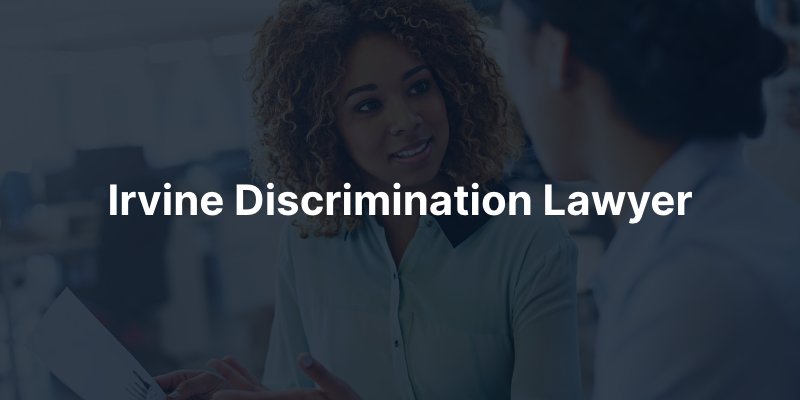Discrimination is an unjust and unlawful practice that has no place in the workplace. At Aegis Law Firm, our Irvine Discrimination Lawyer is dedicated to ensuring individuals who have experienced unfair treatment have a strong legal ally by their side. If you have experienced discrimination, call (949) 379-6250 or message us online to arrange a free consultation today.

Aegis Law Firm distinguishes itself from competitors on multiple fronts. Our partners Kashif Haque and Samuel A. Wong graduated from top law schools and gained invaluable experience from some of the nation’s most prestigious firms. As a result, we are able to offer exceptional legal representation.
We accept discrimination cases on a contingency fee basis, offering a practical and accessible legal solution for individuals facing workplace injustice. In a contingency fee arrangement, our payment is contingent upon winning your case or achieving a favorable settlement. This approach allows you to access skilled legal representation and hold an employer accountable without the immediate strain of legal fees.
Hiring a discrimination lawyer can provide numerous benefits to your claim, including the following:
Legal Knowledge
Discrimination laws can be complex, and a lawyer possesses in-depth knowledge of regulations and precedents, ensuring that your claim is based on a solid legal foundation.
Navigating the Claims Process
Discrimination claims often involve intricate legal procedures, from filing complaints to engaging in negotiations or litigation. A lawyer can guide you through these processes, ensuring that deadlines are met, paperwork is correctly completed, and your rights are protected.
Collecting and Presenting Evidence
Lawyers have the skills and resources to gather evidence and help you build a compelling case.
Negotiation Skills
A lawyer can represent your interests during negotiations, seeking the best possible outcome and fair compensation for the harm you’ve experienced.
Protection Against Retaliation
Employees often fear retaliation after filing a discrimination claim. A lawyer can advise you on your rights and help protect you from potential retaliation.
Court Representation
If negotiation fails to resolve the matter, a discrimination lawyer is prepared to take your case to court.
Peace of Mind
Knowing that you have a knowledgeable and experienced advocate handling your discrimination claim provides peace of mind and allows you to focus on your well-being.
Discrimination in the workplace is prohibited under both California and federal law, with various statutes providing protection against unfair treatment based on certain protected characteristics.
California Fair Employment and Housing Act (FEHA)
FEHA is the primary California statute addressing workplace discrimination. It prohibits discrimination based on the following protected characteristics:
FEHA prohibits various forms of discrimination, including but not limited to:
Title VII of the Civil Rights Act of 1964
Title VII is a federal law prohibiting discrimination based on race, color, religion, sex, or national origin. It applies to employers with 15 or more employees.
Age Discrimination in Employment Act (ADEA)
ADEA prohibits discrimination against employees aged 40 and older based on age. It applies to employers with 20 or more employees.
Americans with Disabilities Act (ADA)
ADA prohibits discrimination against individuals with disabilities, requiring employers to provide reasonable accommodations. It applies to employers with 15 or more employees.
EPA requires employers to pay equal wages for equal work regardless of gender. It applies to employers engaged in interstate commerce and is not limited by the number of employees.
Genetic Information Nondiscrimination Act (GINA)
GINA prohibits discrimination based on genetic information. It applies to employers with 15 or more employees.
Here are common forms of discrimination that employees may experience:
Disparate Treatment
Disparate treatment occurs when employees are intentionally treated differently based on a protected characteristic, such as race, gender, age, or disability. This can manifest in various employment decisions, including hiring, promotions, job assignments, compensation, and termination.
Disparate Impact
Disparate impact refers to policies or practices that, while appearing neutral on the surface, disproportionately impact individuals with certain protected characteristics. Even if unintentional, these policies can result in adverse effects on a particular group.
Harassment
Harassment involves unwelcome conduct based on a protected characteristic, creating a hostile work environment. Harassment can take various forms, including verbal, physical, or visual behavior that creates an intimidating, offensive, or hostile atmosphere.
Retaliation
Retaliation occurs when adverse actions are taken against an employee for engaging in protected activities, such as reporting discrimination, participating in investigations, or asserting their rights under anti-discrimination laws. Retaliation can include actions like termination, demotion, harassment, or other forms of mistreatment.
Failure to Accommodate
Failure to accommodate refers to an employer’s failure to provide reasonable accommodations for employees with disabilities. Reasonable accommodations are adjustments or modifications in the workplace that allow individuals with disabilities to perform their job duties effectively. Examples include providing assistive technology, modifying work schedules, or making physical workplace adjustments.
Individuals who believe they have been subjected to discrimination can file complaints with relevant government agencies such as the Equal Employment Opportunity Commission (EEOC) at the federal level or the California Civil Rights Department (CRD) at the state level.
If you have experienced discrimination, our trusted Irvine employment law lawyer practice is ready to stand by your side. Contact Aegis Law firm to arrange a free consultation by calling (949) 379-6250 or messaging us online. Let us be your advocate justice, fair treatment, and a workplace free from discrimination.